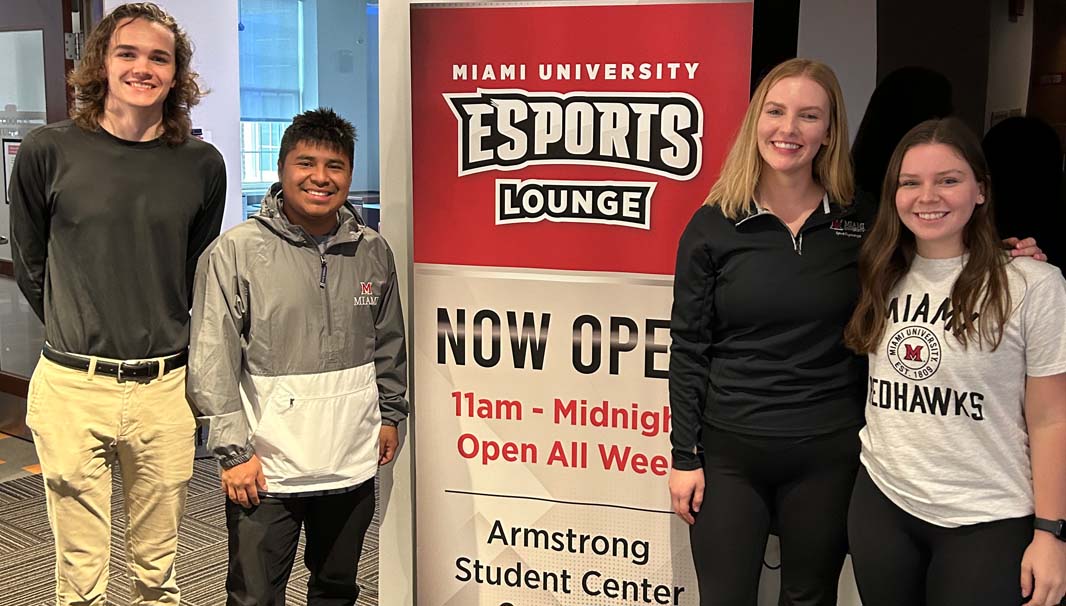SLAM professor and students pioneer sport psychology in the world of esports
“An untapped area from a sport psychology perspective”

SLAM professor and students pioneer sport psychology in the world of esports
Athletes on the field often struggle with the mental aspects of the game, which, in this respect, makes them no different than esports gamers, who also compete just as intensely on screen.
Whether it’s sinking a buzzer-beating three pointer, driving in a bottom of the 9th RBI, or making a do-or-die move to capture the League of Legends Elder Dragon, the pressure to succeed can be excruciating, and those with less mental fortitude can crumble under the weight to perform perfectly.
“Because esports athletes are athletes,” said Jordan Goffena, Miami University visiting assistant professor of Sport Leadership and Management (SLAM) and Miami Athletics mental performance coach. “They are putting in the time just like any other athletes. The difference is that they're not moving their body as much. But the performance factors are all the same.”
These parallels inspired Goffena and his students to pioneer new research that combines traditional aspects of sport psychology with the booming world of esports, which has become a billion-dollar industry within the past decade alone.
“Some of the things we do in sport psychology is mental skills training,” Goffena said. “We use things like self-talk or imagery strategies to help with performances. We also focus on attentional control and anxiety management in performance settings, and sport psychology training can be directly applied to esports training.”
Goffena, who is an expert in self-regulated learning and motivational performance, along with several students – including SLAM graduate student Erica Reymore, along with Eddie Ingersoll, Eli Obrist, and Abby Wolf – began working with Miami’s varsity esports team this past year to explore ways to optimize their performance.
As the nation’s first D1 varsity esports program, Miami’s variety teams were interested in how mental skills training could help continue to secure championships in games like League of Legends, Overwatch, Rocket League, and more.
And it’s a project that will ideally yield win-win results on both sides.
“Our goal was to establish a relationship with esports,” Reymore said, “so that graduate students who are learning sport psychology can also provide educational workshops about mental skills that can help the esports athletes.”
“And this is all student-led,” Goffena added. “They get experience towards their certification as a certified mental performance consultant (CMPC), and they get to work with a whole new diverse population of athletes.”
Initial focus groups revealed that energy management, attention control, and performance routines were among the key areas that varsity esports teams hoped to optimize through these student-led workshops.
“And the athletes took it seriously,” Reymore said. “We covered topics like what are you doing before a big game and how are you taking care of yourself outside of the game? Are you exercising? Are you eating right? A lot of games are also at night, so getting proper sleep is also a big question. One athlete mentioned how little sleep he got because he had classes during the day, but then stayed up late in tournaments.”
The workshops also revealed the importance of teamwork, communication, and team cohesion in esports, which are challenges mirrored in traditional sports.
Traditional sports have had decades to perfect many team-building aspects of play. Esports, however, being a relatively new cultural phenomenon, is still in the early stages of developing these same crucial elements.
“It's an untapped area from a sport psychology perspective,” Goffena said.
“And if we think about certain things that are specific to esports,” he continued, “we come to this idea called ‘tilting.’ It’s a significant emotional response, and it’s often perceived as anger. It’s that moment when esports athletes might throw their controller against the wall in a rage. But what little research that exists says that most people go into tilt because of their own teammates, not the opponents they're playing. So to me that screams a need to work on teamwork, team cohesion, and on communication in order to perform the best they can.”
As the esports industry matures, Goffena and his team hope to uncover more ways mental skills training can continue to mark pivotal points in the evolution of esports. And future workshops will aim to create even more bridges between untapped academic knowledge and real-world performance enhancements within the rapidly growing realm of esports.